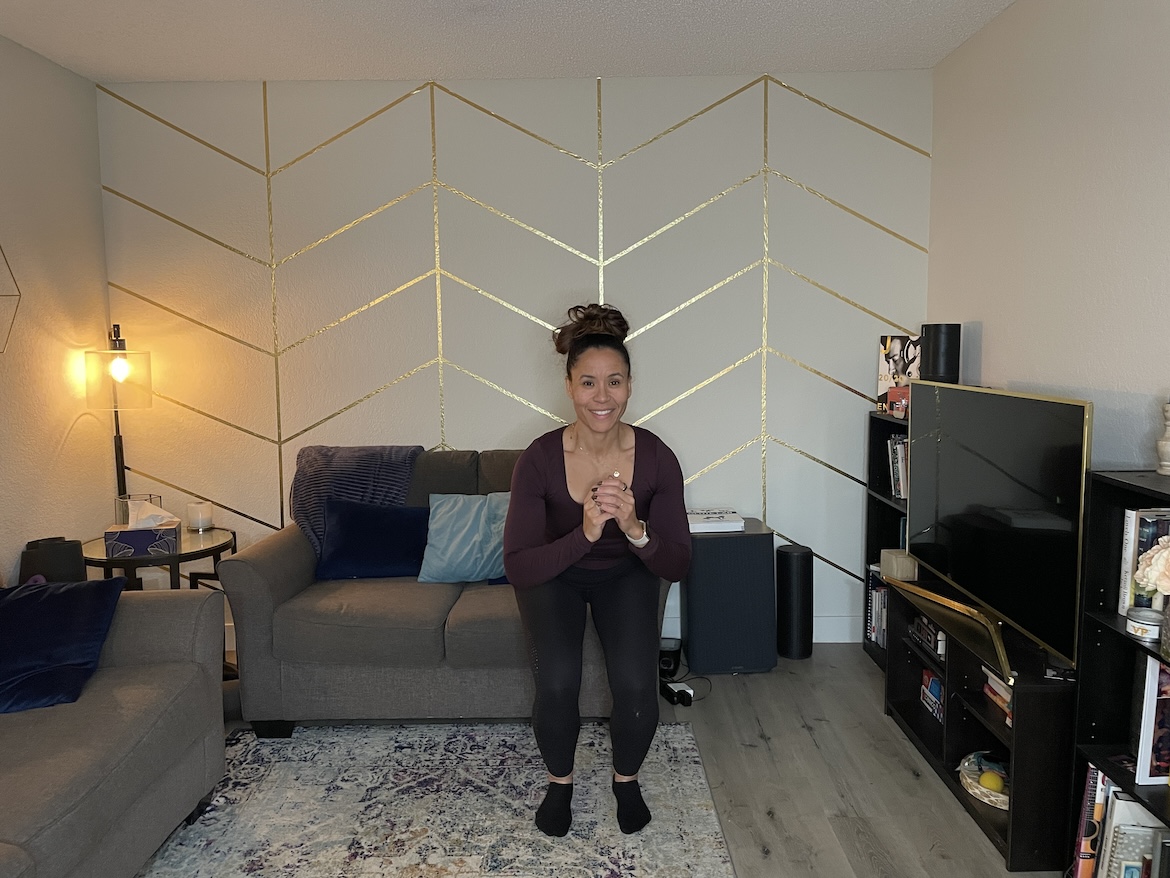When you think about ballet, the first thing that might come to mind is beauty, grace, and maybe a tutu. While ballet is all of that, it’s also a sport that requires incredible amounts of endurance and both physical and mental strength.
“In being a ballet dancer, there are mental things involved, like connecting to your muscles. It’s having to pay attention to every bit of your muscle, and still have to perform at the same time,” says ballet dancer Deidre Sears, founder and artistic director at Elevé Dance Theater. “The most important thing is your core. If your core isn’t strong, it’s very difficult to do anything else.”
If you’re not quite ready to enter into your ballet era, you can attend barre fitness classes, which are low-impact workouts that have used the ballet barre as inspiration. “Barre is an accessible workout that combines the best of the best: the core strength of Pilates, the mindfulness of yoga, the high intensity of strength workouts, and the high energy beats of a dance party, all mixed into a jam-packed 50 minutes of positivity and strength building,” says Michelle Ditto, vice president of training and technique at Pure Barre says.
While barre as a general concept is derived from ballet in terms of how the barre is utilized as a tool for balance, barre as a fitness concept “combines a myriad of tenants of a well-rounded fitness routine with the goals to build strength, improve flexibility, enhance endurance, among many other benefits,” Ditto says.
A 20-minute barre-inspired workout
Find your inner dancer by trying this 20-minute barre-inspired workout created by Sears. All you need is a mat, however, if you struggle with balance, you can use a chair for support.
1. Parallel thigh burner
This exercise builds leg strength and endurance, targeting your inner thighs, quads, and glutes.
Photo: Brittany Hammond, CPT
Stand with your feet hip-width apart, knees slightly bent.
Bend at your hips and knees, lowering your butt 1-2 inches.
Push through your feet to stand back up.
Continue to move up and down in tiny, controlled pulses.
Repeat for 30 small pulses.
2. Plié squat with heel lift (each side separately)
Work your inner thighs, calves, and core with this move, designed to enhance calf and ankle strength all while improving your balance.
Photo: Brittany Hammond, CPT
Stand with your feet wider than hip-width distance apart, arms shaped like an oval with your hands touching.
Point your toes outward at about a 45-degree angle.
While maintaining the squat, lift your right heel off of the floor.
Place your right heel back on the floor.
Repeat for 15 reps on your right leg, then repeat for 15 reps on your left leg.
3. Tendu extension (each side separately)
Target your quads, calves, and hip flexors with this exercise that’ll improve your leg strength and ability to move your feet through flexed and pointed positions with ease.
Photo: Brittany Hammond, CPT
Start standing with your feet hip-width apart, arms shaped like an oval with your hands touching.
Slide your right foot forward, pointing it and keeping your toes in contact with the floor.
Return to the starting position.
Slide your right foot out to the right side, pointing it and keeping your toes in contact with the floor.
Return to the starting position. That’s 1 rep.
Repeat for 10 reps, then complete on your left leg.
4. Arabesque lift (each side separately)
Strengthen your glutes, hamstrings, and lower back while enhancing your balance with this move.
Photo: Brittany Hammond, CPT
Stand with your feet hip-width apart, arms shaped like an oval with your hands touching.
Extend your right leg straight behind you and lift it slightly, keeping your back flat, and hips square.
Lower your right leg back down to the floor.
Complete 15 reps on your right side, then repeat on your left leg for 15 reps.
5. Relevé calf raise
This exercise builds strong calves and ankle stability.
Photo: Brittany Hammond, CPT
Stand with your heels together and your toes turned out (first position in ballet), arms shaped like an oval with your hands touching.
Squeeze your core and rise onto your toes (relevé).
Lower to the starting position.
Repeat for 20 reps.
6. Standing side crunch (each side separately)
Strengthen your core, including your obliques (side abs), and improve coordination with this exercise.
Photo: Brittany Hammond, CPT
Stand with your feet hip-width apart with your left hand on your hip and right hand behind your head.
Shift your body weight into your left leg and lift your right knee up and out to the side.
At the same time, drop your right elbow to meet your right knee.
Return to the starting position
Continue for 12 reps on the right side, then repeat on the left for 12 reps.
7. Glutes bridge with pulse
This move activates your glutes, hamstrings, and core, and stabilizes your lower back.
Photo: Brittany Hammond, CPT
Lie faceup with your arms by your sides, knees bent and feet flat on the floor hip-width apart. Your feet should be close enough to your hips that if you reach one hand at a time toward each heel, you could just touch it with your fingers.
Tuck your tailbone slightly. Squeeze your glutes and core, then press your feet into the floor to drive your hips up toward the ceiling, coming into a glutes bridge.
Lower your hips a few inches, but not all the way back to the floor.
Drive your hips back up toward the ceiling. That’s 1 rep.
Repeat for 25 reps.
8. Attitude pulse (each side separately)
This move tones your glutes and hamstrings and improves your hip mobility.
Photo: Brittany Hammond, CPT
Start standing with your feet hip-width apart, hands on your hips.
Lift your right leg behind you, bending at the knee (attitude position).
Pulse your right leg up and down a few inches while maintaining good posture.
Continue for 15 reps on the right leg, then repeat for 15 reps on the left leg.
9. Cat-cow stretch
Cool down with this move, meant to promote flexibility and release tension in your back and shoulders.
Photo: Brittany Hammond, CPT
Start on all fours with your hands and knees on the floor. Align your elbows and shoulders over your wrists and your hips over your knees.
Slowly arch your spine, dropping your belly toward the floor. Look up as you draw your tailbone toward the ceiling (cow pose).
Slowly transition into a rounded spine, tucking your chin toward your spine as you tilt your pelvis forward (cat pose). That’s 1 rep.
Continue alternating between cow and cat poses for 5 reps.
The benefits of barre workouts
1. They build strength
Barre can help you build strength for other activities. “While many high-impact exercises, like running, strengthen large muscles like the quads, hamstrings, and calves, adding in a barre workout can help increase overall strength and allow you to fire from more muscles each time you run,” Ditto says.
Sears, who has been a dancer since she was a child, will sometimes utilize barre as a fitness option since she’s not performing as frequently as she did in her 20s and 30s because it does a great job strengthening your core and inner thighs.
2. They improve endurance
Barre uses isometric contractions and small ranges of motion. “These contractions utilize your slow-twitch muscle fibers that can increase stamina and the oxygen capacity of your muscles,” Ditto says. “This increases endurance and allows the body to burn energy for longer periods of time.”
3. They boost flexibility
“The health benefits of increasing your overall range of movement are endless, from improving circulation to injury prevention,” Ditto says. “Tension and tightness in your muscles and the tendons around them can lead to back pain, poor posture, and can make everyday tasks, like bending down to tie your shoes, more difficult.”
4. They promote good posture
“In a barre class, your core muscles are used throughout, whether you’re working them as the primary focus or they’re being used as stabilizer muscles for a position working a different muscle group, such as the thighs or butt,” Ditto says.
5. They enhance your mind-body connection
“Barre classes challenge you to not only go through the motions of the workout, but to connect your thoughts and focus to each and every tiny muscle you are working,” Ditto says.





